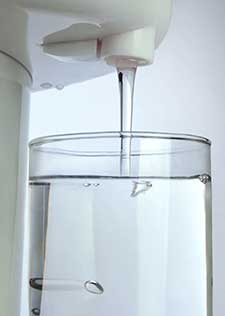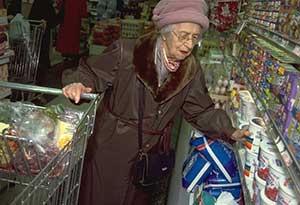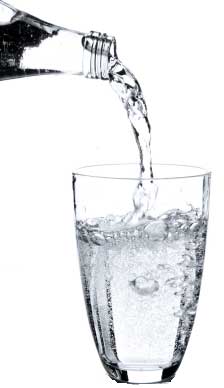Completion requirements
View
Topic Overview

- Older adults are at increased risk for dehydration because of age-related changes.
- Signs of dehydration include skin “tenting” in the forehead, concentrated urine, dizziness, increased heart rate, dryness in the nose and mouth, constipation and can lead to acute confusion and even death.
- Healthy older adults should aim for 1.5-2 L (6-8 cups) of fluid intake per day. Your client or loved one needs approximately 25 mL/kg body weight of fluid daily.
Introduction

- Water is an essential nutrient and component of the body.
- Water transports wastes, supports tissue/cell structure and helps to regulate body temperature.
- Fluids and food that is liquid at room temperature count as water. Juice, milk, coffee/tea (caffeinated and decaffeinated), soup, frozen deserts, Jello, soda pop liquid nutritional supplements all count as water/fluid with the exception of alcohol.
- Dehydration or lack of water in the body may result from either not drinking enough or an increase in fluid losses (e.g. extreme heat, vomiting and diarrhea).
- Older people are especially prone to dehydration because their ability to recognize their need for fluids or thirst declines with age.
- It is essential that caregivers understand how to identify and prevent this potentially life-threatening condition.
What You Should Know
Age-Related Changes
 Aging changes the way the body functions and increases
the risk of your family member or client developing dehydration.
Aging changes the way the body functions and increases
the risk of your family member or client developing dehydration.
- The function of the kidneys, which helps to regulate fluid declines.
- The ability to recognize thirst decreases.
- The amount of total body water decreases. So even a small change in fluid intake can cause dehydration.
Other Factors
The following factors can lead to dehydration:
- kidney problems
- medications such as diuretics (water pills) increase the amount of fluid excreted from the body
- conditions such as Parkinson's disease, strokes or dementia may cause swallowing difficulties that can lead to a decrease in fluid intake
- inability to feed oneself
- fear of requiring help with toileting or being incontinent
Signs of Dehydration
 Signs of dehydration include:
Signs of dehydration include:
- dry mouth and nose
- loose and/or dry skin
- skin "tenting" in the forehead
- increased tiredness and/or weakness
- restlessness
- sudden (acute) confusion
- concentrated urine
- dizziness and orthostatic hypotension (standing causes sudden drop in blood pressure, feeling dizzy, and even fainting)
- increased heart rate
- loss of appetite
- constipation
- nausea and vomiting
Some of these symptoms, such as dry mouth, loose and/or dry skin, and constipation, may occur as a result of age-related changes rather than dehydration.
How to Avoid Dehydration
To help avoid dehydration, your family members and clients should be encouraged to:
- Spread out fluid intake throughout the day, rather than drinking large amounts at one time.
- Drink 1.5 - 2 L (6 - 8 glasses) of fluids per day unless your loved one or client has a medical condition that would require a fluid restriction such as congestive heart failure.
- Keep a variety of beverages available that are acceptable with your dietary restrictions (i.e. sugar free soda for a diabetic).
- Consume moist foods such as fresh fruits, soups and yogurt.
- Take medications one at a time with sips of fluid in-between.
- Find out what they like to drink from whether it be from a crystal goblet or a plastic water bottle. Have fluids close at hand at all times.
- Identify medications that may cause fluid loss, e.g., diuretics (water pills).
When Medical Help is Needed
Seek medical attention:
- if symptoms of dehydration persist, or
- if you observe your family member or client having swallowing difficulties such as choking, throat clearing or coughing after eating or drinking.
Resources
Dietitians of Canada
- Main Website: The Dietitians of Canada website provides information on healthy eating and dietary options.
- The Importance of Water includes information about dehydration and the elderly and taking a proactive approach to preventing dehydration.
Last modified: Wednesday, 27 April 2022, 9:22 AM